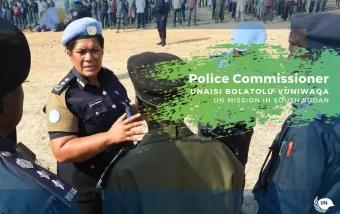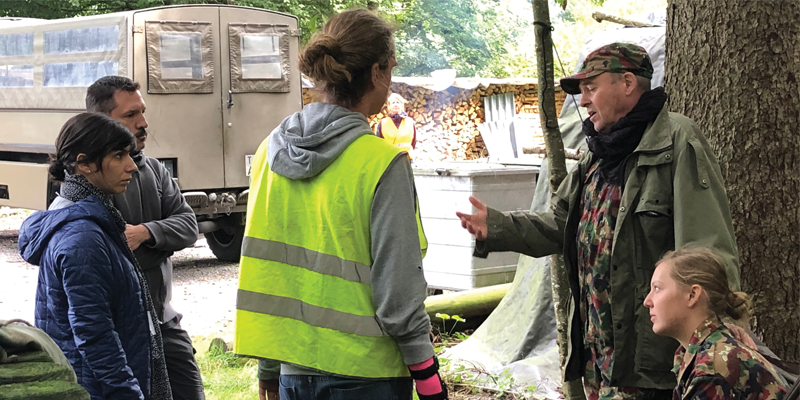GCSP Co-hosts 1st UNPOL Women Police Command Cadre Professional Development Webinar

GCSP Co-hosts 1st UNPOL Women Police Command Cadre Professional Development Webinar
On International Women’s Day 2021, the United Nations Police Division, Office of Rule of Law and Security Institutions, Department for Peace Operations (DPO) in cooperation with the GCSP launched the first UNPOL Women Police Command Cadre Professional Development Webinar. The two-day event - with over 100 senior women police commanders from 56 countries - was organized virtually 8-9 March, 2021, from the UN Headquarters in New York with colleagues from DPO, GFP and UNDP and the GCSP at the Maison de la Paix in Geneva. The overall purpose of the webinar was to strengthen the impact of UNPOL’s 170-strong Cadre as well as numbers of policewomen in UN peace operations and throughout the UN system.
The UNPOL Command Cadre was briefed on the latest strategic developments in international policing by the staff of UN Police Division, UNDP Crisis Bureau and the UN Global Focal Point arrangement for the Rule of Law. In addition to co-hosting the overall webinar, the GCSP was pleased to deliver the sessions on Leading with Impact, Strengthening Conflict Analysis in Fragile Contexts, and Making the Difference in Peace, Security and Development: Results Based Management and Beyond. The Webinar was opened by Mr Luis Carrilho, UN Police Adviser; Ambassador Christian Dussey, Former Director (2013-2021), GCSP, and Ms Katy Tompson, Head of the Rule of Law, Crisis Bureau, UNDP Participants engaged in two parallel live webinar channels in English and in French, with trainers switching channels and languages between the two platforms.
In his opening remarks, Ambassador Christian Dussey, highlighted the critical role that UN Police continue to play as a beacon of inspiration with its relentless work in strengthening women leadership for peace. The UN Police Division, led by Police Adviser Luís Carrilho, was acknowledged for its steadfast commitment to prioritizing and realizing the Women, Peace and Security Agenda across UN Missions and Operations.
Framing the webinar and all matters international policing is the Strategic Guidance Framework for International Policing (SGF). The SGF - unique and universal at the same time - is a gender responsive, evidence-based and field-tested approach to policing. Most incredibly, it was developed in partnership with all 193 Member States of the UN (not only those that currently contribute with police personnel). Critical contributions to the SGF development have been provided by the AU, EU, INTERPOL, OSCE, the International Association of Chiefs of Police, academia and UN system partners via five regional and four thematic consultative meetings. The SGF is in full conformity with all international norms and standards in crime prevention and criminal justice. It is human rights and humanitarian law compliant. The Strategic Guidance Framework was supported through several consecutive Security Council Resolutions (SCR2167 in 2014, SCR2185 in 2014 and SCR2382 in 2017). And finally, it was endorsed as a UN system-wide policing doctrine by the UN Secretary-General in his reports in 2016 (S/2016/952) and 2018 (S/2018/1183) respectively.
In effect, the development and global realization of the SGF - from guidance materials to training modules, which is currently under way, and effective implementation is a tremendous achievement by the UN Police Division, but also and equally important, the broader UN system and all the managers and key policing experts involved from the UN agencies and programmes, regional organizations, professional policing associations, and indeed all UN Member States, who have contributed with their best and brightest knowledge, expertise and concepts, to make the SGF the tangible and internationally accepted invaluable framework of practical standards and tools it is today.
Following the first day’s sessions provided by the UN Police Division, the UNDP and the Global Focal Point, the GCSP was invited to lead sessions focused on some of the fundamental complexities that are challenging leaders and managers of peace operations, in the areas of conflict analysis and results-based management. The webinar was concluded with a dedicated session on cultivating and accelerating the participants personal and professional leadership development.
The module on Conflict Analysis focused on the role, relevance and importance for commanding international missions. Why is effective conflict analysis in fragile contexts so critical? What tools for conflict settings are particularly useful and what are some of the most common mistakes – potentially negative game changers– that the police commander need to look out for and mitigate? The game changing challenges explored included: 1) Longitudinal aspects – from historical groundings to strategic forecasting; 2) The required multiple lenses for full understanding and sense making; 3) Unconscious and misplaced transfer of conflict analysis methodologies from one conflict to another; and 4) Being technically right, but wrong or ineffective application. Topics covered in the conversation also included how conflict analysis can be used to influence the evolution of the mission mandate? What challenges of mission command could be significantly reduced by having a robust conflict analysis methodology and process in place?
The module on Making the Difference in Peace, Security and Development: Results Based Management and Beyond was co-delivered by the GCSP, DCAF and the Small Arms Survey. The session explored why a robust results-based management framework is critical to leading international missions and operations today. Essentially, it is about: 1) Providing line of sight and ensuring strategic coherence; 2) Bringing focus on mission impact and outcome – effectiveness, not only efficiency. Are we making a difference vs are we busy?; and it, 3) validates and ensures sustainability of programmes and processes. The conversation also elaborated on for which areas it is especially important for an UNPOL Commander to measure impact? And similar to the discussion on conflict analysis, the group explored what challenges of mission command could be reduced by having a clear overview of mission impact and results?
The final session focused on strengthening professional and personal leadership. The session was delivered by the Geneva Leadership Alliance at the GCSP and the Gender and Inclusive Security Cluster. Customized for leading missions and operations from a senior female police perspective, the participants explored the DAC Leadership model of Direction (Goals), Alignment (Roles and Responsibilities) and Commitment (Showing up and staying when it gets tough) and how this model could help in the thinking about whether effective leadership is happening in any situation and what is required if it is not. The participating women police officers – with ranks from Major to Major General - shared many of their own experiences, which was then pulled together and discussed from the perspective of seven themes that speak to the mindsets and behaviours of successful women leaders. The GCSP seven women leadership themes are: 1) Focus on your purpose, 2) Behave authentically; 3) Own your power; 4) Connect across boundaries, 5) Integrate into one whole; 6) Have courage and agency; and 7) Be accountable.
The UNPOL - GCSP co-hosting of the 1st Women Police Command Cadre Webinar was a continuation of and building on a longstanding fruitful cooperation between the UN DPO – particularly with PD - and the GCSP. The webinar built on the outcomes of the UN Police Week in November 2020, when GCSP was invited to facilitate the panel conversation on the Future of UN Policing with the currently serving 18 Heads of UN Police Components. It also drew on the results of the GCSP 25th Anniversary Celebrations, when UN Police Adviser, Luís Carrilho, shared the UNPOL vision and current direction at the high-level panel on The New Normal? Imagining UN Peace Operations 2030.
The challenges of leading and commanding peace operations are becoming, if possible, even more uncertain, demanding and complex, given the way the world is unfolding. The increasingly divisive political contexts, the volatile environments, the accelerating impact of climate change and the pandemic on already complex conflict dynamics, make UN missions and operations more demanding than ever.
In this light, the UNPOL initiative to launch this series of professional development webinars for the women commanders of tomorrow of its UNPOL Command Cadre is particular timely. The current and emerging senior leaders and commanders who attended the webinar will be at the core of UN policing. GCSP Deputy Director, Christina Orisich, in her concluding remarks for the webinar thanked the UN Police Division for its ground-breaking role in advancing women leaders. She also paid tribute to the Women Police Leaders participating in the webinar for their courage, drive, commitment, perseverance, loyalty and service. It had indeed been an extraordinary experience to celebrate International Women’s Day with such an outstanding group of capable and resourceful group of Women Leaders!
Ms Annika Hilding Norberg is Head of GCSP Peace Operations and Peacebuilding executive education and training, policy applicably research and advise, dialogue and discussion. She currently focuses on Strengthening inclusive leadership for peace and security; The New Agenda for Peace; and the Future of UN peace operations, special political and peacebuilding missions. Annika serves on the Board of Directors of the International Leadership Association and on the Management Committee of the Geneva Peacebuilding Platform.

